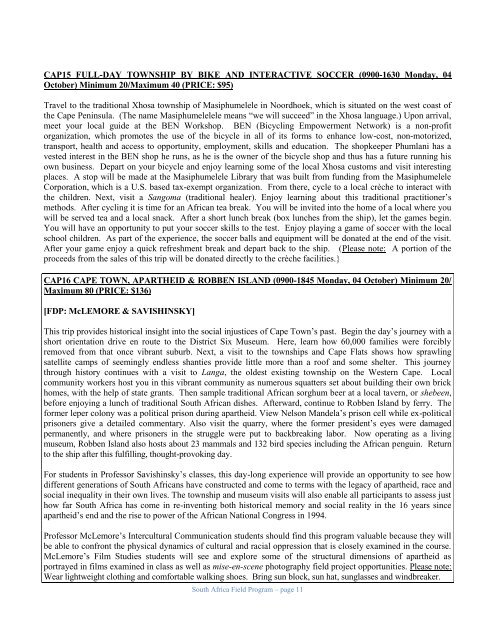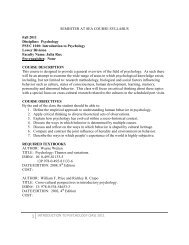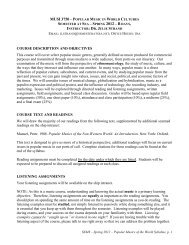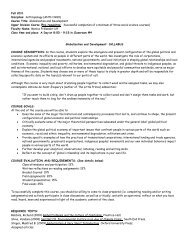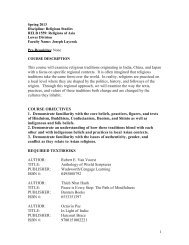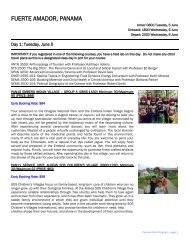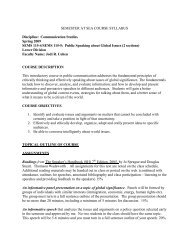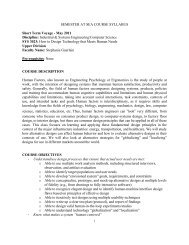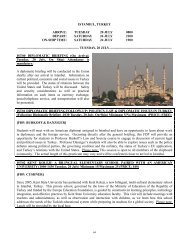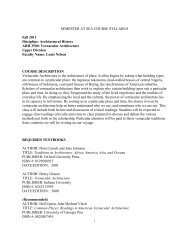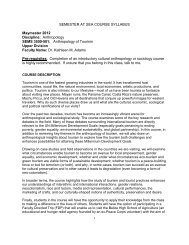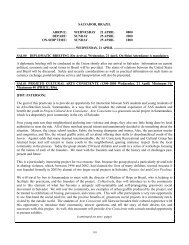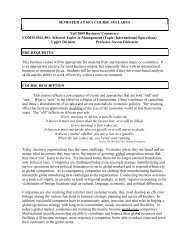Final Field Program - University of Virginia
Final Field Program - University of Virginia
Final Field Program - University of Virginia
You also want an ePaper? Increase the reach of your titles
YUMPU automatically turns print PDFs into web optimized ePapers that Google loves.
CAP15 FULL-DAY TOWNSHIP BY BIKE AND INTERACTIVE SOCCER (0900-1630 Monday, 04<br />
October) Minimum 20/Maximum 40 (PRICE: $95)<br />
Travel to the traditional Xhosa township <strong>of</strong> Masiphumelele in Noordhoek, which is situated on the west coast <strong>of</strong><br />
the Cape Peninsula. (The name Masiphumelelele means ―we will succeed‖ in the Xhosa language.) Upon arrival,<br />
meet your local guide at the BEN Workshop. BEN (Bicycling Empowerment Network) is a non-pr<strong>of</strong>it<br />
organization, which promotes the use <strong>of</strong> the bicycle in all <strong>of</strong> its forms to enhance low-cost, non-motorized,<br />
transport, health and access to opportunity, employment, skills and education. The shopkeeper Phumlani has a<br />
vested interest in the BEN shop he runs, as he is the owner <strong>of</strong> the bicycle shop and thus has a future running his<br />
own business. Depart on your bicycle and enjoy learning some <strong>of</strong> the local Xhosa customs and visit interesting<br />
places. A stop will be made at the Masiphumelele Library that was built from funding from the Masiphumelele<br />
Corporation, which is a U.S. based tax-exempt organization. From there, cycle to a local crèche to interact with<br />
the children. Next, visit a Sangoma (traditional healer). Enjoy learning about this traditional practitioner‘s<br />
methods. After cycling it is time for an African tea break. You will be invited into the home <strong>of</strong> a local where you<br />
will be served tea and a local snack. After a short lunch break (box lunches from the ship), let the games begin.<br />
You will have an opportunity to put your soccer skills to the test. Enjoy playing a game <strong>of</strong> soccer with the local<br />
school children. As part <strong>of</strong> the experience, the soccer balls and equipment will be donated at the end <strong>of</strong> the visit.<br />
After your game enjoy a quick refreshment break and depart back to the ship. (Please note: A portion <strong>of</strong> the<br />
proceeds from the sales <strong>of</strong> this trip will be donated directly to the crèche facilities.}<br />
CAP16 CAPE TOWN, APARTHEID & ROBBEN ISLAND (0900-1845 Monday, 04 October) Minimum 20/<br />
Maximum 80 (PRICE: $136)<br />
[FDP: McLEMORE & SAVISHINSKY]<br />
This trip provides historical insight into the social injustices <strong>of</strong> Cape Town‘s past. Begin the day‘s journey with a<br />
short orientation drive en route to the District Six Museum. Here, learn how 60,000 families were forcibly<br />
removed from that once vibrant suburb. Next, a visit to the townships and Cape Flats shows how sprawling<br />
satellite camps <strong>of</strong> seemingly endless shanties provide little more than a ro<strong>of</strong> and some shelter. This journey<br />
through history continues with a visit to Langa, the oldest existing township on the Western Cape. Local<br />
community workers host you in this vibrant community as numerous squatters set about building their own brick<br />
homes, with the help <strong>of</strong> state grants. Then sample traditional African sorghum beer at a local tavern, or shebeen,<br />
before enjoying a lunch <strong>of</strong> traditional South African dishes. Afterward, continue to Robben Island by ferry. The<br />
former leper colony was a political prison during apartheid. View Nelson Mandela‘s prison cell while ex-political<br />
prisoners give a detailed commentary. Also visit the quarry, where the former president‘s eyes were damaged<br />
permanently, and where prisoners in the struggle were put to backbreaking labor. Now operating as a living<br />
museum, Robben Island also hosts about 23 mammals and 132 bird species including the African penguin. Return<br />
to the ship after this fulfilling, thought-provoking day.<br />
For students in Pr<strong>of</strong>essor Savishinsky‘s classes, this day-long experience will provide an opportunity to see how<br />
different generations <strong>of</strong> South Africans have constructed and come to terms with the legacy <strong>of</strong> apartheid, race and<br />
social inequality in their own lives. The township and museum visits will also enable all participants to assess just<br />
how far South Africa has come in re-inventing both historical memory and social reality in the 16 years since<br />
apartheid‘s end and the rise to power <strong>of</strong> the African National Congress in 1994.<br />
Pr<strong>of</strong>essor McLemore‘s Intercultural Communication students should find this program valuable because they will<br />
be able to confront the physical dynamics <strong>of</strong> cultural and racial oppression that is closely examined in the course.<br />
McLemore‘s Film Studies students will see and explore some <strong>of</strong> the structural dimensions <strong>of</strong> apartheid as<br />
portrayed in films examined in class as well as mise-en-scene photography field project opportunities. Please note:<br />
Wear lightweight clothing and comfortable walking shoes. Bring sun block, sun hat, sunglasses and windbreaker.<br />
South Africa <strong>Field</strong> <strong>Program</strong> – page 11


